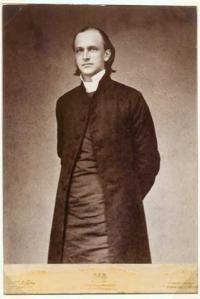 "He came here the other day and talked with me about the rascality of this Indian business until I felt it down to my boots."
"He came here the other day and talked with me about the rascality of this Indian business until I felt it down to my boots."
Abraham Lincoln on Henry Whipple's report during his visit to the President in the fall of 1862.
From, in part, Henry Benjamin Whipple: An Inventory of His Papers at the Minnesota Historical Society.
Henry B. Whipple was born February 15, 1822, in Adams, New York, the son of John Hall and Elizabeth Wager Whipple.
On June 30, 1859, Whipple was elected the first Protestant Episcopal bishop of Minnesota, an office he held until his death more than forty years later.
He made regular missionary sojourns by wagon or coach through the rural areas of the state, often in mid-winter, preaching in cabins, school houses, stores, saloons, and Indian villages.
Whipple was best known outside of Minnesota for his dedication to the welfare of Indian people and for his missionary work among the Dakota and Ojibwe. He returned from his first visitation of his diocese with a firm commitment to the establishment of Indian missions and the reform of the U.S. Indian system. He regularly included Indian villages on his visitations, built up the Episcopal mission to the Ojibwe based at White Earth Reservation, and appealed for support of Indian missions by addresses throughout the United States and Europe.
As an outspoken and prestigious advocate of Indian administration reform, Whipple was looked to as a leader by individuals and organizations concerned with the Indians’ welfare. He corresponded with congressmen, army officers, officials of the U.S. Department of the Interior, and presidents of the United States, urging that the Indians be dealt with honestly, justly and humanely, and that the existing system of Indian administration be thoroughly revised to permit the Indian to live in dignity and decency. He made numerous trips to Washington, D.C., especially during the 1860s, to plead in person for Indian reform and to expose abuses in the Indian service, appealed for support through newspapers and church publications, and lectured on Indian affairs.
Whipple’s suggestions for reform of the Indian system included treating tribes as wards of the government instead of as independent nations; paying annuities in kind rather than in cash; providing practical industrial education for Indians and separate homesteads for those who wanted them; appointing honest Indian agents; dealing with Indians as individuals rather than as tribes; enforcing laws through the use of Native police and through trial, by a U. S. Indian commissioner, of any white men who violated Indian laws; concentrating different bands of a tribe onto a single reservation; and refusing to permit liquor to be sold to Indians.
In addition to being consulted on Indian affairs by government officials, Whipple served on several commissions authorized to negotiate treaties or to oversee the Indian’s welfare, including the Sioux Commission (1876), the Northwest Indian Commission (1887), several commissions appointed to oversee annuity payments to the Chippewa of Minnesota (1860s), and the U.S. Board of Indian Commissioners (1895-1901). He also attended several Lake Mohonk Conferences of Friends of the Indian and served on the Episcopal Church’s Joint Committee to Secure Protection of the Civil Law for the Indians (1878-1883).
In the early years of his episcopate, Whipple’s espousal of Indian reform and commitment to Indian missions earned him the enmity of many whites who hated Indians, and led some of his fellow bishops to look upon him as a fanatic. His attitude was denounced most bitterly after the U.S.-Dakota War 1862, when, in appeals to the President and in the public press, he opposed wholesale executions and extermination or deportation of the Dakota.
Henry Benjamin Whipple: An Inventory of His Papers at the Minnesota Historical Society. Manuscripts Collection.
Primary
Henry Benjamin Whipple:An Inventory of His Papers at the Minnesota Historical Society . Manuscripts Collection
Whipple, Henry Benjamin. Lights and Shadows of a Long Episcopate. New York: Macmillan, 1902.
Secondary
Nichols, David A. Lincoln and the Indians:Civil War Policy and Politics. Chicago: University of Illinois Press, 1978




